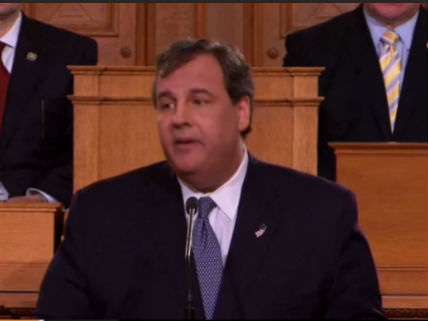Chris Christie Will End the War on Drugs—Just Like Obama Did

During his State of the State speech yesterday, New Jersey Gov. Chris Christie promised to "end the failed war on drugs." Wait a minute. Didn't the Obama administration end the war on drugs way back in 2009? Drug czar Gil Kerlikowske says it did.
It turns out that Christie, who first called the war on a drugs a "failure" in 2012 (eight years after Barack Obama did), has something similar in mind. He does not want to stop responding to drug use with violence; he just wants to make "drug treatment" more "available," which entails forcing nonviolent drug offenders into treatment by threatening to lock them in cages. Sadly, that does count as an improvement. Most people arrested on drug charges no doubt would prefer treatment to jail. But what is the moral justification for compelling that choice? If the state does not take that approach with alcoholics (except when they have broken the law in ways that endanger or harm others), why should it treat users of arbitrarily proscribed drugs this way?
"We will end the failed war on drugs that believes that incarceration is the cure of every ill caused by drug abuse," Christie said. "We will make drug treatment available to as many of our non-violent offenders as we can, and we will partner with our citizens to create a society that understands this simple truth: every life has value and no life is disposable." Yet Christie's plan depends on the continued use of incarceration, as a punishment for people who supply arbitrarily proscribed substances and as a threat against people who consume them but do not want treatment. Their desires and choices do not matter, because the government has decreed that they do not have a right to control their own bodies and their own destinies, that they should instead be treated like children, who cannot be trusted to judge their own interests. That is a strange way of showing respect for each person's humanity.
Some critics of the war on drugs praised Christie's comments. "I was delighted to be present for the governor's swearing in and to hear him make such promising remarks surrounding drug policy reform in our state," says Roseanne Scotti, New Jersey state director for the Drug Policy Alliance. "The Drug Policy Alliance and advocates throughout New Jersey look forward to working with the Christie administration to address the unacceptable and unjust consequences of the drug war." National Review's Kevin Williamson calls Christie's talk of "ending" the war on drugs "revolutionary stuff."
It is hard for me to muster the same enthusiasm. Although Christie's version of the drug war may prove to be less bad than the ones waged by Bill Clinton and Barack Obama (whose drug czars made similar noises), it should not be confused with drug peace, which requires renouncing the use of force against people whose only crime consists of consuming politically disfavored intoxicants or helping others do so.


Show Comments (27)